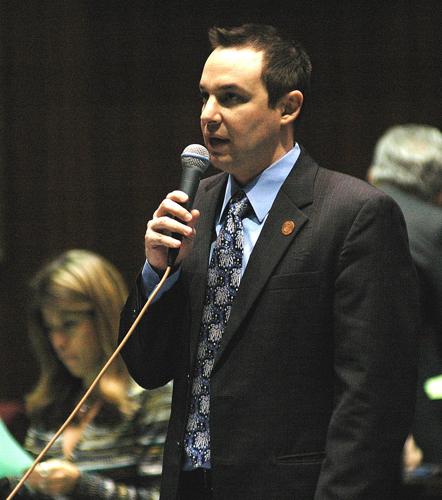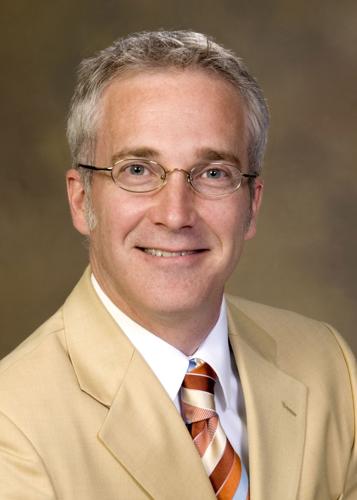Campaign finance
A measure given preliminary House approval Wednesday could allow charities to spend money on ballot measures without disclosing their activities and their donors to the public.
HB 2296 deals with groups organized under Section 501(c)(3) of the Internal Revenue Code. They are supposed to spend most of their money on charitable purposes.
While they cannot seek to influence who is elected, they can spend up to 20 percent on political and lobbying activities. And that latter category includes ballot measures.
Rep. J.D. Mesnard, R-Chandler, said his main goal is to protect charities from having to make public the names of their donors. But the measure exempts these charities from filing any campaign finance reports, a move that could permit them to fund independent expenditure campaigns for or against ballot measures without having to report any of those activities.
It now needs a roll-call vote.
Gun regulations
The state House voted 33-21 Wednesday to forbid state and local governments from helping to enforce any federal law, act, order or rule that deals with the personal possession of firearms and infringes on the constitutional right of people to have weapons.
Rep. Anthony Kern, R-Glendale, said HB 2300 spells out what he says is already the right of state and local governments: to refuse to help the federal government implement its laws. But the legislation goes beyond that, cutting off state funds from any local government that does agree to cooperate.
The measure also subjects any employee who knowingly violates the law to a $3,000 fine for a first offense and up to six months in jail for subsequent violations.
Proponents see the measure as a way of countering any moves by the Obama administration to impose regulations on the transfer of firearms. That would include closing what some see as a loophole in laws that say those who buy weapons at gun shows are not subject to the requirement of a background check.
Wednesday’s vote came over the objections Rep. Randall Friese, D-Tucson. He said a 2015 online poll shows that close to two-thirds of Arizonans want stiffer gun regulations to keep weapons out of the hands of those who should not have them.
Separately, the House gave preliminary approval to HB 2338. It allows people who can lawfully possess weapons to have them on streets and other public rights of way even if they run through a public school, community college or university campus. Nothing in the measure, however, allows individuals to bring those guns into school buildings.
Local control
The state Senate voted 17-12 Wednesday to deny state shared revenues to cities and counties that enact ordinances that the attorney general determines are contrary to state law.
SB 1487 is being pushed by Senate President Andy Biggs, R-Gilbert. He said some cities have effectively ignored restrictions the Legislature has placed on cities, doing so because they have concluded there is no way for the state to enforce its will. Taking away their share of $600 million distributed would do that, he said.
Sen. Martin Quezada, D-Phoenix, said lawmakers should not “take away the ability of our local elected officials to enact the best laws they can.” He acknowledged that some communities are doing things the Legislature does not like, such as proposing their own minimum wages and regulating the use of plastic bags. But Quezada said that is no reason to take away their share of state revenues.
Water supply
Without debate the Senate on Wednesday voted to impose a new hurdle on counties that want to have their own water restrictions.
State law already imposes some restrictions on development in “active management areas” where groundwater supplies are at risk. There are five such areas in the state — Prescott, Phoenix, Pinal, Pima and Santa Cruz — covering close to 15,000 square miles.
Cochise and Yuma counties have imposed their own requirements that developers show an adequate water supply. That, however, has thrown some legal roadblocks into plans for a 7,000-home development in Sierra Vista as well as a proposal for a development of up to 28,000 homes in Benson.
SB 1400, sponsored by Sen. Gail Griffin, R-Hereford, requires any county-enacted proposal to be reconsidered every five years, with a specific requirement for Cochise and Yuma counties to vote within two years. And the restrictions can be reenacted only by a unanimous vote, meaning a single supervisor can thwart the move.
Griffin also is the sponsor of SB 1268, approved by the Senate a week ago, which permits cities to ignore county ordinances on assured water supply.
Public meetings
City councils, county boards of supervisors, school boards and other public agencies would be required to make audio and video recordings of all meetings — open and executive sessions — under terms of legislation given preliminary House approval Wednesday.
Current law requires these agencies to keep minutes of their meetings. It also allows a judge to review the minutes of closed sessions to determine if there were discussions taking place behind closed doors that should have occurred in public.
HB 2583 requires the public portions of the meeting to be made available on agency websites, with the executive sessions kept for review by courts, just like the current requirement for minutes.
Rep. Charlene Fernandez, D-Yuma, worried about the cost, saying there are small school districts in her area that don’t have video equipment. But Rep. Bob Robson, R-Chandler, said even a recording made with a cell phone would comply with the law.
The measure needs a roll-call vote before going to the Senate.
Supreme Court
Arizona lawmakers want to add two more justices to the state’s high court.
The court currently consists of five justices, a figure it has had since 1960, when it was raised from just three. Rep. J.D. Mesnard, R-Chandler, said it makes sense to go to seven given the size of the state.
Mesnard also said it could result in more diversification on the bench.
If HB 2537 becomes law the Commission on Appellate Court Appointments would screen candidates and make nominations. The final decision would be up to Gov. Doug Ducey.
That would give him three of the seven on the bench after he named Clint Bolick to the court in January. The measure requires a final House vote.
Capitol Media Services On Twitter: @azcapmedia







